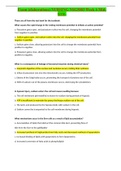Nursing nsg5003 week 6 - Study guides, Class notes & Summaries
Looking for the best study guides, study notes and summaries about Nursing nsg5003 week 6? On this page you'll find 44 study documents about Nursing nsg5003 week 6.
Page 2 out of 44 results
Sort by
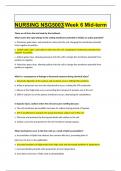
-
NURSING NSG5003 Week 6 Mid-term
- Exam (elaborations) • 10 pages • 2023
-
- $14.99
- + learn more
NURSING NSG5003 Week 6 Mid-term These are all from the test bank for the textbook. What causes the rapid change in the resting membrane potential to initiate an action potential? a. Potassium gates open, and potassium rushes into the cell, changing the membrane potential from negative to positive. b. Sodium gates open, and sodium rushes into the cell, changing the membrane potential from negative to positive. c. Sodium gates close, allowing potassium into the cell to change the membrane...
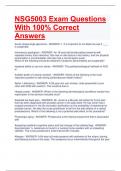
-
NSG5003 Exam Questions With 100% Correct Answers
- Exam (elaborations) • 19 pages • 2023
-
Available in package deal
-
- $14.39
- + learn more
NSG5003 Exam Questions With 100% Correct Answers Acute closed-angle glaucoma - ANSWER- 1. It is important to not dilate the eye if ____ is suspected. Intravenous pyelogram - ANSWER- An 18-year-old female patient presents with repeated urinary tract infections. She has no risk factors in her history, and her physical examination is unremarkable. She also has a normal pelvic exam. Which of the following should be obtained if anatomic abnormalities are suspected? Impaired ability to use ...
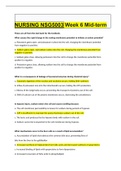
-
NURSING NSG5003 Week 6 Mid-term
- Exam (elaborations) • 10 pages • 2022
-
- $14.29
- + learn more
NURSING NSG5003 Week 6 Mid-term These are all from the test bank for the textbook. What causes the rapid change in the resting membrane potential to initiate an action potential? a. Potassium gates open, and potassium rushes into the cell, changing the membrane potential from negative to positive. b. Sodium gates open, and sodium rushes into the cell, changing the membrane potential from negative to positive. c. Sodium gates close, allowing potassium into the cell to change the membrane...
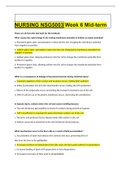
-
NURSING NSG5003 Week 6 Mid-term
- Exam (elaborations) • 10 pages • 2022
-
- $13.49
- + learn more
NURSING NSG5003 Week 6 Mid-term These are all from the test bank for the textbook. What causes the rapid change in the resting membrane potential to initiate an action potential? a. Potassium gates open, and potassium rushes into the cell, changing the membrane potential from negative to positive. b. Sodium gates open, and sodium rushes into the cell, changing the membrane potential from negative to positive. c. Sodium gates close, allowing potassium into the cell to change the membrane...
Exam (elaborations) NURSING NSG5003 Week 6 Mid-term.
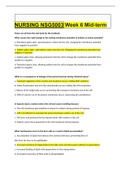
-
NURSING NSG5003 Week 6 Mid-term
- Exam (elaborations) • 10 pages • 2022
-
- $12.49
- + learn more
NURSING NSG5003 Week 6 Mid-term These are all from the test bank for the textbook. What causes the rapid change in the resting membrane potential to initiate an action potential? a. Potassium gates open, and potassium rushes into the cell, changing the membrane potential from negative to positive. b. Sodium gates open, and sodium rushes into the cell, changing the membrane potential from negative to positive. c. Sodium gates close, allowing potassium into the cell to change the membrane...
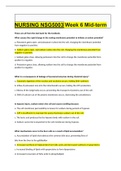
-
NURSING NSG5003 Week 6 Mid-term
- Exam (elaborations) • 10 pages • 2022
-
- $10.49
- + learn more
These are all from the test bank for the textbook. What causes the rapid change in the resting membrane potential to initiate an action potential? a. Potassium gates open, and potassium rushes into the cell, changing the membrane potential from negative to positive. b. Sodium gates open, and sodium rushes into the cell, changing the membrane potential from negative to positive. c. Sodium gates close, allowing potassium into the cell to change the membrane potential from positive to negativ...
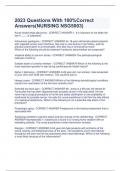
-
2023 Questions With 100%Correct Answers(NURSING NSG5003)
- Exam (elaborations) • 20 pages • 2023
-
Available in package deal
-
- $10.99
- + learn more
2023 Questions With 100%Correct Answers(NURSING NSG5003) Acute closed-angle glaucoma - CORRECT ANSWER-1. It is important to not dilate the eye if ____ is suspected. Intravenous pyelogram - CORRECT ANSWER-An 18-year-old female patient presents with repeated urinary tract infections. She has no risk factors in her history, and her physical examination is unremarkable. She also has a normal pelvic exam. Which of the following should be obtained if anatomic abnormalities are suspected? ...
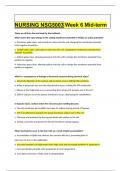
-
NURSING NSG5003 Week 6 Mid-term
- Exam (elaborations) • 10 pages • 2023
-
- $7.19
- + learn more
NURSING NSG5003 Week 6 Mid-term These are all from the test bank for the textbook. What causes the rapid change in the resting membrane potential to initiate an action potential? a. Potassium gates open, and potassium rushes into the cell, changing the membrane potential from negative to positive. b. Sodium gates open, and sodium rushes into the cell, changing the membrane potential from negative to positive. c. Sodium gates close, allowing potassium into the cell to change the membrane...
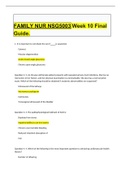
-
FAMILY NUR NSG5003 Week 10 Final Guide.
- Exam (elaborations) • 55 pages • 2022
-
- $13.99
- + learn more
Week 10 Final Guide. 1. It is important to not dilate the eye if is suspected. Cataract Macular degeneration Acute closed-angle glaucoma Chronic open-angle glaucoma Question 2. 2. An 18-year-old female patient presents with repeated urinary tract infections. She has no risk factors in her history, and her physical examination is unremarkable. She also has a normal pelvic exam. Which of the following should be obtained if anatomic abnormalities are suspected? Ultrasound of the kidn...

How much did you already spend on Stuvia? Imagine there are plenty more of you out there paying for study notes, but this time YOU are the seller. Ka-ching! Discover all about earning on Stuvia

